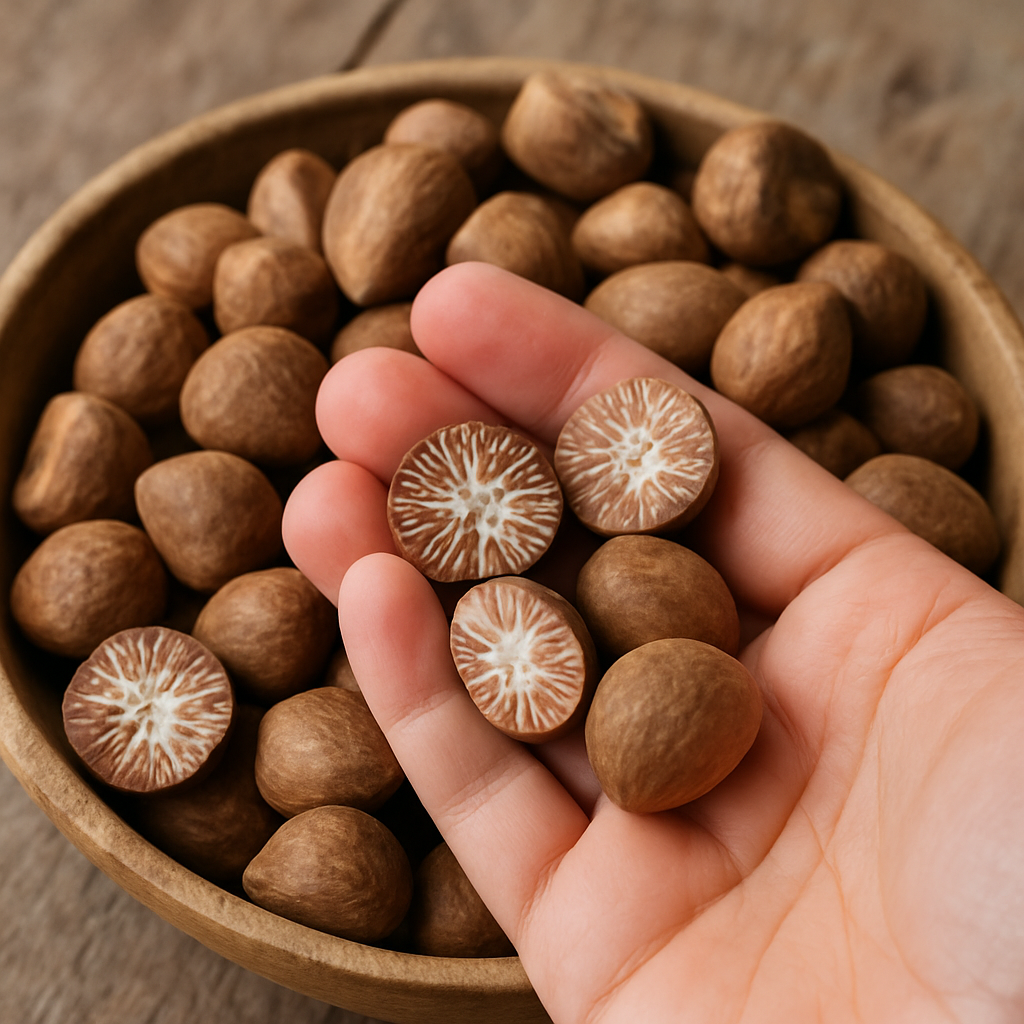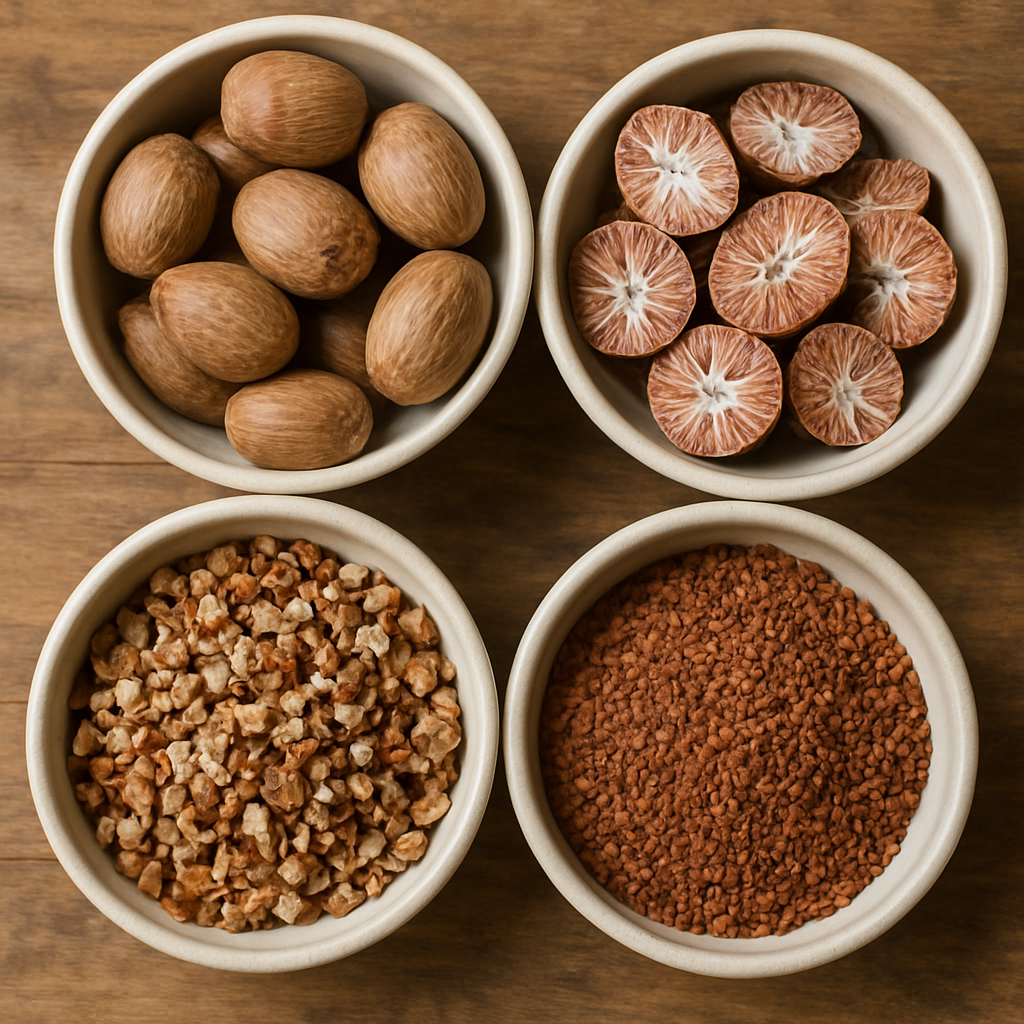Ask Ayurvedic doctor a question and get a consultation online on the problem of your concern in a free or paid mode. More than 2,000 experienced doctors work and wait for your questions on our site and help users to solve their health problems every day.
What Is Supari: Ayurvedic Uses, Benefits, and Risks

If you’ve ever wondered what is supari and why it’s so widely chewed across Asia, you’re not alone. Known more commonly as betel nut, supari has been used for centuries in traditional medicine and social rituals. People talk about supari benefits in Ayurveda — from digestion aid to boosting alertness. At the same time, betel nut effects on health can be controversial, with studies warning about possible risks.
This article dives into the world of supari, exploring its cultural roots, uses, types, and health concerns. We’ll also clarify common confusions like areca nut vs betel nut or even the difference between jaiphal and supari. By the end, you’ll have a clearer view of why this small nut is so significant and whether it’s truly worth consuming.

What Is Supari and Its Cultural Importance
Supari, also called betel nut, comes from the seed of the areca palm tree. In many countries like India, Sri Lanka, and parts of Southeast Asia, supari isn’t just a food item — it’s a cultural symbol. Weddings, pujas, and even daily social interactions often involve offering supari as a gesture of respect.
But beyond tradition, people chew it as a mild stimulant. Some say it helps them stay awake, others just enjoy the taste, especially when wrapped in betel leaf with lime and spices (known as paan). This combination has deep social roots, almost like how coffee brings people together in other parts of the world.
What Is Betel Nut and How It Relates to Supari
Many ask: what is betel nut exactly? Well, it’s the same thing as supari. Betel nut is simply the English term. In Hindi and other Indian languages, it’s more common to say supari. However, it’s important not to confuse it with betel leaf — the leaf is different, though the two are often used together in chewing preparations.
Areca Nut vs Betel Nut: Understanding the Terms
Here’s where it gets tricky. Technically, the correct term is areca nut, since it comes from the Areca catechu palm. But most people around the world call it betel nut because it’s chewed with betel leaf. So when you see areca nut vs betel nut discussions, remember — they’re usually referring to the exact same nut, just with different names. The only “difference between areca nut and betel nut” is really linguistic.

Don't wait or self medicate. Start chat with Doctor NOW
Supari Benefits in Ayurveda and Traditional Practices
Ayurveda, India’s ancient system of natural medicine, places supari in the category of herbs that support digestion and energy. Traditional healers recommend small amounts of supari to freshen breath, increase saliva flow, and sometimes to treat intestinal worms.
Some texts even mention that supari strengthens gums and teeth (though modern research doesn’t always support this). And while these supari benefits sound appealing, they come with a big caution: dosage matters. Chewing it occasionally might be okay, but daily or excessive use can lead to very different results.
Betel Nut Effects on Body and Mind
When chewed, supari releases alkaloids that act as stimulants. The immediate betel nut effects include a warming sensation, slight euphoria, and increased alertness. Many compare the “kick” to drinking strong tea or coffee. For some, it also improves digestion after heavy meals.
However, the mind-body effects are not always positive. Some users report increased heartbeat, sweating, or even dizziness if they consume too much. And over time, regular use may lead to dependency, which we’ll discuss later under supari side effects.

Types of Supari and Their Uses
There are actually several types of supari. Some are raw, sun-dried, or boiled, while others are roasted or sweetened with spices. Each type has its own purpose:
-
Raw supari – often used in rituals and pujas.
-
Boiled or dried supari – commonly chewed on its own or mixed in paan.
-
Flavored supari – sweet, spiced, or even sugar-coated, popular among younger consumers.
In Ayurveda, specific forms of supari may be recommended depending on the condition being treated. But again, the line between benefit and harm is quite thin.

Supari Side Effects and Safety Concerns
While Ayurveda highlights some supari benefits, modern science has raised many red flags about its safety. Chewing supari might feel harmless at first, but over time it can have serious implications.
Short-Term Betel Nut Effects
Immediately after chewing, supari can cause increased salivation, faster heartbeat, and a mild buzz or euphoria. Some people experience sharpened alertness — which is why laborers and students sometimes rely on it to stay awake. But the short-term betel nut effects aren’t always pleasant.
For example, first-time users may feel nausea or even stomach cramps. It can also stain teeth and lips with a reddish-brown color that’s difficult to remove. A few chewers complain of headaches or trouble sleeping if they consume too much in the evening. So even in the short term, it’s not exactly risk-free.
Long-Term Health Risks of Supari Consumption
The real problem shows up with habitual use. Regular supari chewing has been linked to:
-
Oral health issues – gum disease, mouth ulcers, and teeth discoloration.
-
Addiction – the nut contains arecoline, a substance that can make it highly habit-forming.
-
Oral submucous fibrosis – a condition where the mouth lining stiffens, making it hard to eat or even talk.
-
Cancer risks – studies have shown strong associations between long-term betel nut chewing and oral cancers.
So while some praise supari for its energy boost, doctors and researchers strongly warn against frequent use. The “kick” may come at too high a cost.
Differences Between Related Spices and Nuts
Since supari is often compared with other nuts and spices, let’s clear up the confusion.
Difference Between Jaiphal and Supari
Many people ask about the difference between jaiphal and supari. Jaiphal is simply nutmeg, a spice from the seed of Myristica fragrans. It’s used mainly in cooking, baking, and Ayurveda for its calming effects. Supari, on the other hand, is stimulating rather than calming.
Where jaiphal (nutmeg) helps people sleep better or relax, supari tends to make you more alert and energized. So, comparing nutmeg vs betel nut, we see they’re not only different botanically but also opposite in effect.
Difference Between Areca Nut and Betel Nut
This one’s simpler. The so-called difference between areca nut and betel nut is really none at all. Both terms describe the same seed from the Areca catechu palm. The confusion comes because the nut is usually chewed with betel leaf, so over time people started calling it betel nut. Essentially, areca nut vs betel nut is just a naming issue, not two separate things.
How Ayurveda Views Supari Consumption
Ayurveda’s take on supari is nuanced. Traditional texts describe it as pitta-shamak (balancing excess heat in the body) and supportive for digestion when used sparingly. In small amounts, supari may freshen the mouth, reduce kapha (phlegm), and give a quick energy lift.
However, Ayurveda also emphasizes moderation — “the dose makes the medicine.” Consuming supari every day, in large quantities, is not advised. Instead, it’s meant to be an occasional aid, especially during ceremonies or as part of a broader herbal preparation.
Some Ayurvedic doctors even warn that modern supari consumption has gone far beyond traditional recommendations. The addition of sweeteners, artificial flavors, and tobacco (in commercial paan masala) makes it more dangerous than the simple, ritualistic use of ancient times.
Conclusion
Supari, or betel nut, holds a fascinating place in history, culture, and medicine. From its symbolic role in rituals to its debated role in Ayurveda, this little seed has many sides. On one hand, there are supari benefits like improved digestion and alertness. On the other, there are strong warnings about supari side effects — from oral health damage to addiction and even cancer.
Understanding what is supari and how it works is the first step to making informed choices. Whether you look at betel nut effects as beneficial or risky, balance and moderation are key.
FAQs
Are betel nut and areca nut the same?
Yes, they are the same. The term areca nut is botanically correct because it comes from the Areca catechu palm tree. Betel nut is the common name people use since it’s usually chewed with betel leaf. So the “difference between areca nut and betel nut” is basically just in wording, not substance.
Is supari addictive?
Unfortunately, yes. Supari contains an alkaloid called arecoline, which can create dependency over time. This is why many people find it hard to stop once they’ve developed the habit. What starts as casual chewing during social gatherings often turns into a daily ritual, and quitting may lead to withdrawal symptoms like irritability or cravings.
Can supari cause health problems?
Definitely. While there are a few supari benefits in small, occasional doses, long-term chewing is linked to major oral health issues, gum disease, mouth stiffness, and even oral cancers. The risks outweigh the short-term pleasure for most people. So if you’re already chewing regularly, it’s a good idea to cut back.
What is the difference between nutmeg and betel nut?
This is where the nutmeg vs betel nut comparison comes in. Nutmeg (jaiphal) is a spice used in cooking and traditional remedies, often for relaxation, improving sleep, or aiding digestion in a soothing way. Betel nut (supari) is stimulating, more like caffeine or nicotine, and has a completely different effect on the nervous system. They’re not interchangeable, even though both are seeds.
The Bigger Picture: Supari in Modern Times
Supari has traveled a long journey from being a sacred offering in religious rituals to a widely consumed stimulant across Asia. Today, it exists in many forms — from raw pieces to sweetened, flavored varieties sold in colorful packets. For some, it’s cultural pride. For others, it’s simply a habit that’s hard to shake.
The challenge now is awareness. Many people still don’t realize how harmful regular supari chewing can be. The cultural importance often overshadows the scientific warnings. And when supari is mixed with tobacco, as in gutkha, the dangers multiply drastically.
Should You Use Supari?
If you’re looking at supari purely from an Ayurvedic perspective, a small, occasional piece might have its place — as a digestive aid or ritualistic item. But in the real world, where chewing often becomes a daily addiction, the health concerns can’t be ignored.
So, should you use it? The short answer: better not to. If you do, keep it rare and minimal. And always be mindful of what’s mixed into it — plain, traditional supari is very different from modern processed products loaded with additives.
If you found this article helpful, share it with friends and family. Awareness around supari can literally save lives. And if you’re interested in more Ayurvedic insights and health guides, be sure to follow our blog for future articles.

